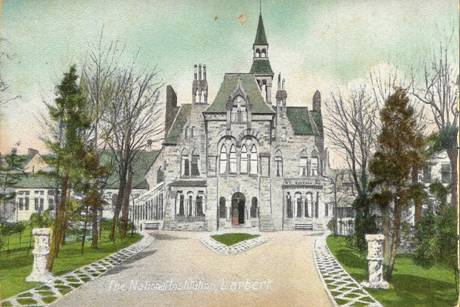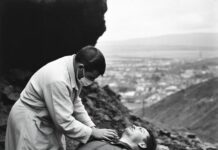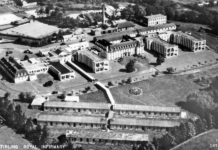In 2013, the surviving papers and photographs of the Royal Scottish National Hospital (RSNH), where Forth Valley Royal Hospital now stands, were recognised as being of outstanding historical importance by UNESCO, the cultural body of the United Nations. Only a few collections are selected each year, so this was a fantastic testament to the records’ value as corporate and cultural memory.
The RSNH was established in 1862 and was the foremost hospital providing custodial care for children with mental illness in Scotland in the 19th and 20th centuries. It gained an international reputation for its enlightened approach to care and treatment, attracting patients from England and across the British Empire. Describing the hospital site in 1873, one journalist wrote of the flowers bordering the approach to the main entrance and the buttercups and daisies that grew in the children’s playgrounds.
The extensive surviving archives of the RSNH provide a comprehensive record of the management and operation of the hospital. They contain a wealth of information about children from across Scotland who required treatment and care; the lives of their parents and families; and the figures in their local communities who supported their applications. The stories of these children are recorded in the case notes and other hospital records which document their treatment and care. For a detailed history of the RSNH, you can find a copy of Guthrie Hutton’s book The Royal Scottish National Hospital: 140 years in the library at Forth Valley Royal Hospital.
Speaking at the time of the UNESCO citation, former NHS Forth Valley Chief Executive, Professor Fiona Mackenzie, commented that the RSNH had challenged prejudice and influenced social change during the 19th and 20th centuries. The hospital was a trailblazer and its legacy was one of care and compassion. She added: “Although now demolished, and the site of the Forth Valley Royal Hospital, its memories live on, and it is still held in affection both by many NHS Forth Valley staff and members of the local community.”
The role of NHS Forth Valley at the heart of its community in central Scotland cannot be overstated. The Health Board not only delivers essential treatment and care to patients across the region but is a major employer and training provider as well as playing a key role in many local supply chains. It is therefore crucial that we, the current generation of staff at NHS Forth Valley, do everything we can to safeguard records of historic significance. Archives are important because they allow us to understand and contribute to the lives of people around us. They allow us to reflect on our past, both as individuals and as a society, help capture and document memories and form part of a community’s sense of identity and belonging.
Sadly, so much of our corporate memory has been lost, not intentionally, but through organisational and technological change. For example, whilst we can still read the rich records relating to the children who called RSNH home, we no longer have any records relating to its time as a military hospital during World War II. In addition, as we transition to an increasing digital environment, some records may be lost during migration or are seen as ‘old’ and not having any ongoing value.
Archives and records matter because they underpin and support many aspects of local and national government and enable them to function effectively. On a personal level, without records, we could not prove where and when we were born or who owns the property we live in. We could not trace our ancestry, explore our identities or hold organisations to account. The impact of archives can be felt right across society, underpinning academic research, fuelling the digital economy (think of the rise of international ancestry tourism) and inspiring innovation and creativity. Records and archives are also crucial for public enquiries like The Scottish Child Abuse Inquiry which aims to help individuals to get to the truth or to find closure and redress.
It has been ten years since the RSNH archive was recognised as an internationally important collection, in this, the 75th anniversary of the NHS, we need to ensure that the rich history of NHS Forth Valley is collected and preserved for the future.
Please contact fv.corporaterecords@nhs.scot if you have any records, paper or digital, that you feel need to be transferred to our NHS Archive at Stirling University for permanent preservation.







